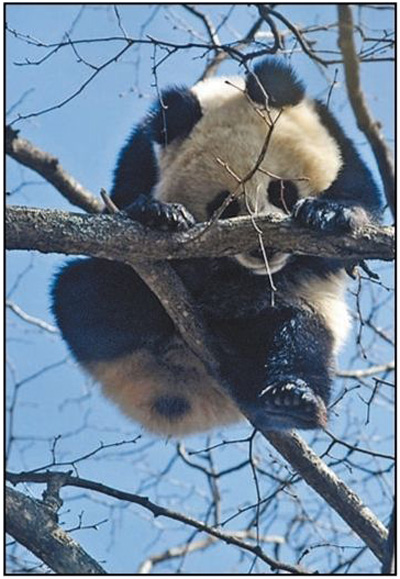


Volunteers install a camera in the wild. (Photo/Zhang Wen)
An outstanding team of young volunteers are contributing their expertise to the protection of giant pandas in Tangjiahe Nature Reserve in southwest China’s Sichuan Province.
These panda guardians work at Baixiongping conservation station in the nature reserve, which is one of the first two giant panda field monitor stations in the country.
They developed a smart anti-poaching system consisting of infrared cameras, smart facial recognition, and a signal transmission sub-system to facilitate wildlife protection.
“The system can automatically identify potential poachers and send back real-time images,” said Diao Pengkun, deputy head of the conservation station, adding that since the establishment of the system last October, they have prevented several cases of poaching.
They also established a small solar power station for power supply in the conservation station.

A panda in Tangjiahe Nature Reserve (Photo provided by Tangjiahe Nature Reserve)
29-year-old Gu Weilong came to the reserve four years ago and became a maintenance volunteer for infrared cameras, sensors and other devices.
Gu was once a second officer on board a freighter. He introduced maritime liaison equipment to the conservation station, which enables positioning of the patrol at any time.
He also modified walkie-talkies, expanding the coverage range from 4 kilometers to more than 10 kilometers.
Chen Huanqi, another volunteer, wrote an image recognition program to realize intelligent reading and recognition of photos taken by infrared cameras.
27-year-old Wang Haiying, with a master’s degree in ecology, has been a volunteer at the conservation station for more than one year.
She said that volunteers have to collect feces of wild animals such as giant pandas, leopards and black bears for DNA analysis and population estimation.
The conservation station has also implemented some research projects, with research papers published in core journals across the country, the deputy head said.
He hoped that more outstanding volunteers would become panda guardians and help boost conservation work.
Last year, heads and volunteers of the conservation station were invited by China’s Ministry of Education to share what they have done in wildlife conservation with young students in Beijing.
 Fire brigade in Shanghai holds group wedding
Fire brigade in Shanghai holds group wedding Tourists enjoy ice sculptures in Datan Town, north China
Tourists enjoy ice sculptures in Datan Town, north China Sunset scenery of Dayan Pagoda in Xi'an
Sunset scenery of Dayan Pagoda in Xi'an Tourists have fun at scenic spot in Nanlong Town, NW China
Tourists have fun at scenic spot in Nanlong Town, NW China Harbin attracts tourists by making best use of ice in winter
Harbin attracts tourists by making best use of ice in winter In pics: FIS Alpine Ski Women's World Cup Slalom
In pics: FIS Alpine Ski Women's World Cup Slalom Black-necked cranes rest at reservoir in Lhunzhub County, Lhasa
Black-necked cranes rest at reservoir in Lhunzhub County, Lhasa China's FAST telescope will be available to foreign scientists in April
China's FAST telescope will be available to foreign scientists in April "She power" plays indispensable role in poverty alleviation
"She power" plays indispensable role in poverty alleviation Top 10 world news events of People's Daily in 2020
Top 10 world news events of People's Daily in 2020 Top 10 China news events of People's Daily in 2020
Top 10 China news events of People's Daily in 2020 Top 10 media buzzwords of 2020
Top 10 media buzzwords of 2020 Year-ender:10 major tourism stories of 2020
Year-ender:10 major tourism stories of 2020 No interference in Venezuelan issues
No interference in Venezuelan issues
 Biz prepares for trade spat
Biz prepares for trade spat
 Broadcasting Continent
Broadcasting Continent Australia wins Chinese CEOs as US loses
Australia wins Chinese CEOs as US loses